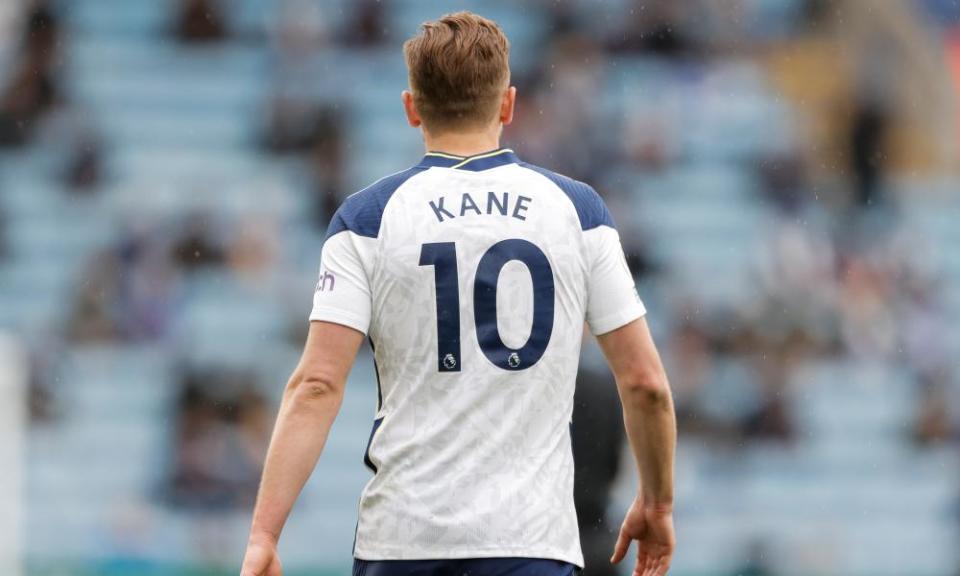Harry Kane hits nuclear button but must hope it does not blow up in his face

So now we know. Harry Kane really is prepared to do whatever it takes to force a move from Tottenham to Manchester City. The question had nagged away since the final week of last season when Kane and his camp had given the definitive signal that they wanted out and the battle lines were drawn, with Daniel Levy, the Spurs chairman, digging in and refusing to countenance the sale.
Would Kane be prepared to activate the nuclear option and withdraw his cooperation at Spurs? Surely not, most people had hoped, because to do the dirty like this would be so unbecoming of a homegrown hero, of an England captain.
Related: Harry Kane fails to report at Tottenham training ground as he seeks transfer
And yet on Monday morning, Kane did the dirty, he did the bad thing, the last-resort play, when he refused to turn up for his first day of pre-season tests and checks. Now we knew.
What a mess, and the first thing to say is that Kane has let himself down. There has been some understanding among Spurs fans about his desire to join a club that can challenge for the biggest prizes this season, even if none of them have wanted to picture the reality of him actually wearing the colours of a rival.
They know how Spurs ended the previous season – without a permanent manager, with qualification only to the new Europa Conference League (they have been drawn to face Paços de Ferreira or Larne in the play-off round), with disarray the most prominent sentiment. And they know that under Nuno Espírito Santo, appointed as José Mourinho’s replacement after a chaotic 72-day search, it is likely that there will be a period of transition.
Why should Kane, who turned 28 last Wednesday and has not won any team honours, want to stick around for that? Most of the supporter anger has been directed at Levy for enabling the climate for such a situation to develop.
Kane was on a reasonably firm footing. Everybody knows that he wants to leave. Why not sit tight, focus on his conditioning and respect his contract for another month while the negotiations with City – or any other high-bidding club – play out? It has been obvious that Kane, after a three-week post-Euro 2020 break, will struggle to be fit for Spurs’ season-opener on Sunday week, coincidentally against City, and, thereafter, they have only two league matches before the transfer window closes – against Wolves and Watford on 22 and 29 August respectively. Kane has gone early with the awol move.
The upside of not reporting for work is questionable because one thing is plain – it will only harden Levy’s position, his resolve that Kane is not for sale and, if he absolutely is to be prised away, it would be for an eye-watering sum, which is rather more than the £100m City have offered. The defending champions have dismissed as nonsense the notion that they would pay £160m. Players in part-exchange could enter the equation but those deals are notoriously difficult to balance.
The downside for Kane is the reputational damage. He has built a career upon single-mindedness, an ability to blot out the criticism and background noise in pursuit of his goals, and it has long been held up as a positive. It no longer feels entirely that way.
Kane’s decision comes from a place of overwhelming frustration, at how he feels trapped by the six-year deal that he signed in 2018 and the lack of success of his exit strategy, which has been marked, increasingly, by openness. He wanted to leave last summer only for Levy to stand in his way and the terms of a so-called gentleman’s agreement for a departure this time are open to interpretation.
Kane has perhaps learned a lesson from history, having seen the lengths to which previous Spurs stars had to stoop to drive moves. Levy refused to say whether Dimitar Berbatov had gone on strike to get his transfer to Manchester United in 2008 – the striker missed matches against Sunderland and Chelsea before the deal went through – although a quote from the chairman was telling. “That’s something you’re going to have to ask him but, clearly, he didn’t play for those two games,” Levy said in November of that year.
Luka Modric failed to board the flight for a tour to the United States in the summer of 2012 – the one in which he eventually joined Real Madrid – and Gareth Bale became difficult in the summer of the following year before also going to Real. By the end of that transfer window, Bale was refusing to report for training. “It’s up to the club to decide if it’s a fineable offence,” said André Villas-Boas, the manager at the time. Levy had blocked Modric’s proposed move to Chelsea in the summer of 2011, despite the player claiming he had a gentleman’s agreement with him.
And yet those dramas were from different times and it would probably be wise to look purely at the current circumstances, with Levy operating in a coronavirus-scarred financial landscape, fan unrest high and Kane’s goals, not to mention what he means to the club, feeling extremely hard to replace.
Spurs were not prepared to discuss whether Kane was on strike and there are other more obvious imponderables, including the player’s mindset if he were retained against his will. Levy would hope that Kane simply gets over the disappointment.
What next? Will Kane be in on Tuesday? Spurs do not know. In Kane’s mind, it is all in the game. He needs an end to justify the means.

 Yahoo Sport
Yahoo Sport 





































